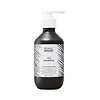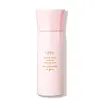What's inside
What's inside
 Key Ingredients
Key Ingredients

 Benefits
Benefits

 Concerns
Concerns

 Ingredients Side-by-side
Ingredients Side-by-side

Aloe Barbadensis Leaf Juice
Skin ConditioningSodium Methyl Cocoyl Taurate
CleansingCocamidopropyl Betaine
CleansingDecyl Glucoside
CleansingCoco-Glucoside
CleansingGlyceryl Oleate
EmollientPropanediol
SolventHydrolyzed Quinoa
Skin ConditioningPolyquaternium-10
Potassium Sorbate
PreservativeOlea Europaea Fruit Oil
MaskingMentha Piperita Oil
MaskingHippophae Rhamnoides Fruit Oil
Skin ProtectingMentha Arvensis Callus Lysate
AntioxidantHydrolyzed Jojoba Esters
Skin ConditioningLinum Usitatissimum Seed Oil
PerfumingSqualane
EmollientHelianthus Annuus Seed Oil
EmollientMacadamia Ternifolia Seed Oil
EmollientRosmarinus Officinalis Leaf Extract
AntimicrobialSerenoa Serrulata Fruit Extract
Skin ConditioningHibiscus Sabdariffa Flower Extract
Skin ConditioningHylocereus Undatus Fruit Extract
Skin ConditioningUrtica Dioica Leaf Extract
Skin ConditioningEquisetum Arvense Leaf Extract
AstringentChamomilla Recutita Flower Extract
MaskingPentylene Glycol
Skin ConditioningCaprylyl Glycol
EmollientEthylhexylglycerin
Skin ConditioningCitric Acid
BufferingAloe Barbadensis Leaf Juice, Sodium Methyl Cocoyl Taurate, Cocamidopropyl Betaine, Decyl Glucoside, Coco-Glucoside, Glyceryl Oleate, Propanediol, Hydrolyzed Quinoa, Polyquaternium-10, Potassium Sorbate, Olea Europaea Fruit Oil, Mentha Piperita Oil, Hippophae Rhamnoides Fruit Oil, Mentha Arvensis Callus Lysate, Hydrolyzed Jojoba Esters, Linum Usitatissimum Seed Oil, Squalane, Helianthus Annuus Seed Oil, Macadamia Ternifolia Seed Oil, Rosmarinus Officinalis Leaf Extract, Serenoa Serrulata Fruit Extract, Hibiscus Sabdariffa Flower Extract, Hylocereus Undatus Fruit Extract, Urtica Dioica Leaf Extract, Equisetum Arvense Leaf Extract, Chamomilla Recutita Flower Extract, Pentylene Glycol, Caprylyl Glycol, Ethylhexylglycerin, Citric Acid
Water
Skin ConditioningButylene Glycol
HumectantDimethyl Isosorbide
SolventPolysorbate 20
EmulsifyingAmp-Acrylates/Allyl Methacrylate Copolymer
Niacinamide
SmoothingPanthenol
Skin ConditioningSodium PCA
HumectantAllantoin
Skin ConditioningHamamelis Virginiana Water
AstringentMentha Piperita Oil
MaskingGlycerin
HumectantTrisodium Ethylenediamine Disuccinate
Citric Acid
BufferingDipotassium Glycyrrhizate
HumectantSodium Lactate
BufferingDextran
Arginine
MaskingAspartic Acid
MaskingPCA
HumectantAcetyl Tetrapeptide-3
Skin ProtectingTrifolium Pratense Flower Extract
AstringentSodium Benzoate
MaskingPhenoxyethanol
PreservativeGlycine
BufferingAlanine
MaskingPisum Sativum Sprout Extract
Skin ConditioningSerine
MaskingValine
MaskingPotassium Sorbate
PreservativeArctium Majus Root Extract
Skin ConditioningArnica Montana Flower Extract
MaskingAscorbic Acid
AntioxidantCalendula Officinalis Flower Extract
MaskingChamomilla Recutita Flower Extract
MaskingCitrus Limon Peel Extract
EmollientHedera Helix Leaf Extract
Skin ConditioningIsoleucine
Skin ConditioningLamium Album Extract
AstringentNasturtium Officinale Extract
PerfumingPinus Sylvestris Bud Extract
PerfumingProline
Skin ConditioningRosmarinus Officinalis Leaf Extract
AntimicrobialSalvia Officinalis Leaf Extract
CleansingThreonine
Biotin
AntiseborrhoeicTocopheryl Acetate
AntioxidantTropaeolum Majus Flower Extract
Skin ConditioningHistidine
HumectantPhenylalanine
MaskingBenzoic Acid
MaskingChlorphenesin
AntimicrobialSodium Dehydroacetate
PreservativeLimonene
PerfumingWater, Butylene Glycol, Dimethyl Isosorbide, Polysorbate 20, Amp-Acrylates/Allyl Methacrylate Copolymer, Niacinamide, Panthenol, Sodium PCA, Allantoin, Hamamelis Virginiana Water, Mentha Piperita Oil, Glycerin, Trisodium Ethylenediamine Disuccinate, Citric Acid, Dipotassium Glycyrrhizate, Sodium Lactate, Dextran, Arginine, Aspartic Acid, PCA, Acetyl Tetrapeptide-3, Trifolium Pratense Flower Extract, Sodium Benzoate, Phenoxyethanol, Glycine, Alanine, Pisum Sativum Sprout Extract, Serine, Valine, Potassium Sorbate, Arctium Majus Root Extract, Arnica Montana Flower Extract, Ascorbic Acid, Calendula Officinalis Flower Extract, Chamomilla Recutita Flower Extract, Citrus Limon Peel Extract, Hedera Helix Leaf Extract, Isoleucine, Lamium Album Extract, Nasturtium Officinale Extract, Pinus Sylvestris Bud Extract, Proline, Rosmarinus Officinalis Leaf Extract, Salvia Officinalis Leaf Extract, Threonine, Biotin, Tocopheryl Acetate, Tropaeolum Majus Flower Extract, Histidine, Phenylalanine, Benzoic Acid, Chlorphenesin, Sodium Dehydroacetate, Limonene
Ingredients Explained
These ingredients are found in both products.
Ingredients higher up in an ingredient list are typically present in a larger amount.
Chamomilla Recutita Flower Extract comes from the Chamomile flower.
Chamomile is rich in antioxidants and has anti-inflammatory properties. Several compounds found in chamomile help with soothing, such as bisbolol.
Antioxidant components in chamomile make it an effective ingredient to help slow the signs of aging. Antioxidants help fight free-radical molecules, or molecules that may damage your skin.
Essential oils from chamomile have been found to improve wound healing due to its antimicrobial properties.
Ancient Greeks and Egyptians used Chamomile to treat skin redness and dryness. Chamomile has also been used to help treat stomach issues.
Learn more about Chamomilla Recutita Flower ExtractCitric Acid is an alpha hydroxy acid (AHA) naturally found in citrus fruits like oranges, lemons, and limes.
Like other AHAs, citric acid can exfoliate skin by breaking down the bonds that hold dead skin cells together. This helps reveal smoother and brighter skin underneath.
However, this exfoliating effect only happens at high concentrations (20%) which can be hard to find in cosmetic products.
Due to this, citric acid is usually included in small amounts as a pH adjuster. This helps keep products slightly more acidic and compatible with skin's natural pH.
In skincare formulas, citric acid can:
While it can provide some skin benefits, research shows lactic acid and glycolic acid are generally more effective and less irritating exfoliants.
Most citric acid used in skincare today is made by fermenting sugars (usually from molasses). This synthetic version is identical to the natural citrus form but easier to stabilize and use in formulations.
Read more about some other popular AHA's here:
Learn more about Citric AcidMentha Piperita Oil is the volatile oil obtained from the whole plant of the Peppermint plant.
It can be used to add a fresh scent to products.
Peppermint oil may cause skin sensitivity and redness due to its menthol content. Menthol also has a cooling effect (like your toothpaste).
Learn more about Mentha Piperita OilPotassium Sorbate is a preservative used to prevent yeast and mold in products. It is commonly found in both cosmetic and food products.
This ingredient comes from potassium salt derived from sorbic acid. Sorbic acid is a natural antibiotic and effective against fungus.
Both potassium sorbate and sorbic acid can be found in baked goods, cheeses, dried meats, dried fruit, ice cream, pickles, wine, yogurt, and more.
You'll often find this ingredient used with other preservatives.
Learn more about Potassium SorbateRosmarinus Officinalis Leaf Extract comes from rosemary. Rosemary is native to the Mediterranean.
While Rosmarinus Officinalis Leaf Oil can be volatile due to its fragrant properties, the fragrance components are usually removed in the leaf extract.
Rosemary Leaf Extract contains many antioxidants such as rosmarinic acid and caffeic acid. Rosemarinic acid, a compound found in rosemary leaf, has been found to help soothe skin conditions such as eczema and acne.
Learn more about Rosmarinus Officinalis Leaf Extract